In the first quarter of 2016, the index of machine tool orders, processed by the Studies Dept. of UCIMU-SISTEMI PER PRODURRE, registered a 14.3% increase compared with the same period of the previous year.
The overall outcome was mainly due to the excellent performances achieved in the Italian market; a positive response also came from the foreign markets.
In particular, the index of orders collected in the foreign markets recorded a 1.7% rise versus the period January-March 2015.
A much more significant upturn was reported with regard to the collection of domestic orders, grown by 31.8% compared with the same period of the previous year. Therefore, the positive trend, registered by the manufacturers in the Italian market, has extended to eleven consecutive quarters.
Luigi Galdabini, President of UCIMU-SISTEMI PER PRODURRE, stated: “In these first months of the year, the demand for machine tools is getting stronger and is growing again considerably, after the slight slowdown experienced in the last period of 2015. All this proves that end users, especially the Italian ones, are willing to invest. In this sense, the weakness at the end of last year is presumably to be attributed to the users’ willingness to take their time in deciding which investments to make, in the light of what was presented at EMO MILANO 2015, the world exhibition held in Milan in the month of October”.
“On the other hand, – continued Luigi Galdabini – the provisions implemented by the Government authorities to support this “new course of the real economy” have undoubtedly contributed to stabilize what at first seemed only a weak trend reversal”.
“Besides the New Sabatini Law, the provision of Super Depreciation is yielding benefits, even if below potential, which could instead be fully exploited with a small amendment to the provision. In particular, – went on Galdabini – we believe that the fixed deadline of 31 December 2016 should concern the collection of orders accompanied by a down-payment bank transfer and not the delivery of machines, which should rather be postponed until 30 June 2017. The separation of the deadlines for the order collection and for the machinery delivery respectively is justified by the fact that the production time of a machine is generally estimated at 5-6 months. By postponing the delivery time of machines – stressed Galdabini – the provision will actually remain valid for its whole planned duration, without causing a burden in the State budget that would only have a delayed inflow of a part of the income related to the operation”.
“Moreover, while acknowledging the effectiveness of these provisions regarding the economic situation, it is necessary to contemplate structural actions aiming at stimulating and supporting the replacement of production systems in the Italian enterprises, the only way to ensure a prosperous future to the manufacturing industry of our country. In this connection, it could be useful to introduce the liberalization of depreciation charges, by which the purchased machinery can be depreciated in shorter time. Besides incentivizing new purchases, this provision would not actually imply costs to be borne by the State, which would only see the cash inflow delayed. If this is not possible, at least it would be necessary to update the depreciation coefficients, still dating back to 1988.”
“This said – concluded Galdabini – the most adequate remedy to avert the ageing of machine tools is the adoption of an incentive programme to encourage the voluntary replacement of obsolete machinery with new technologies, designed and built according to the new requirements of productivity, energy saving and compliance with the EU regulations concerning safety at the workplace. Also because the recent survey conducted by UCIMU on the total machinery installed in Italy provides a really alarming picture of the manufacturing industry of the country, which uses means of production with an average age close to 13 years: the worst result of the last forty years”.


